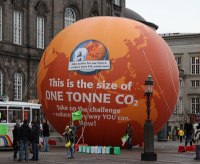The Copenhagen climate change negotiations entered into their final phase today as over one hundred heads of state arrived to take part in the high-level segment of the conference. Leaders are facing a range of questions including the future role of nuclear power.
 |
| Nuclear power avoided 58 billion of these between 1971 and 2004 compared to the 218 billion emitted by other sources of electricity in that time |
The conference organizers have been overwhelmed by the number of delegates trying to participate. There are more than 10,000 delegates from government delegations. These are being given priority over those from civil society (including business, environmental groups and research institutions). Out of 25,000 civil society delegates only around 90 may be allowed in the conference centre on Friday, the final scheduled day of the meeting.
Some environmental groups, including Friends of the Earth, fared even worse, having all their delegates banned without explanation. Early this afternoon the conference centre was sealed with no one allowed to enter or exit the building as protests grew outside. Police had to stop protesters from crossing a security moat around the Bella conference centre using an improvised bridge made of inflatable lilos. Around the city more than 200 were arrested, some suffering head wounds from police batons. Lines have become blurred between mainstream environmental groups and more extreme anticapitalist protesters.
Even the number of heads of state present at the conference is causing problems. So many world leaders want to address the meeting that some are scheduled to give those speeches at 2 am on Friday morning. A preparatory conference call was held yesterday between French President Nicolas Sarkozy, German Chancellor Angela Merkel, UK prime minister Gordon Brown and US President Barack Obama.
There have been major disagreements between developed and developing countries over the prioritisation given to these two tracks. Most developed countries would like to gradually merge these two tracks and begin to introduce emissions reduction measures for major developing countries such as China, India and Brazil. Developing countries are strongly defending the Kyoto Protocol track, believing that the responsibility for emissions reductions should lie with developed countries, which have been responsible for the majority of historic greenhouse gas emissions.
The future of the Kyoto mechanisms is also being negotiated. Parties will decide whether nuclear energy projects will remain excluded from the Clean Development Mechanism and the Joint Implementation mechanisms. Carbon capture and storage projects may also be excluded.
Parties will also decide whether nuclear power projects can be included in national plans presented to the United Nations declaring how they intend to reduce their greenhouse gas emissions.
There is incredible pressure on governments to reach agreement at Copenhagen, however there is little prospect of in-depth agreement on all issues. Many expect decisions on some key issues will be left undecided until the next COP meeting in Mexico City at the end of 2010.







_97013.jpg)






